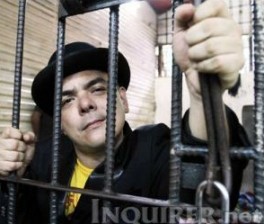Church: Gov’t pursued charges vs Celdran
MANILA, Philippines–The Archdiocese of Manila on Wednesday sought to distance itself from a potential backlash over the court conviction of artist Carlos Celdran by pointing out that the Church did not pursue charges against the popular tour guide for disrupting services at the Manila Cathedral in 2010.
It was the government, through the public prosecutor, that charged Celdran before the courts for “offending religious feelings,” a crime under the Revised Penal Code, said Peachy Yamsuan, communications chief of the Archdiocese of Manila.
The archdiocese did not pursue the case on the instructions of the then Manila Archbishop Gaudencio Cardinal Rosales, she said.
“The Archdiocese of Manila did not pursue the case against Mr. Carlos Celdran for violation of Article 133 of the Revised Penal Code. While deeply disturbed by the incident, (Cardinal Rosales) gave instructions for the Archdiocese to no longer pursue the case,” Yamsuan said in a statement.
The archdiocese issued the statement after President Aquino on Tuesday urged the Catholic Church to “forgive” Celdran.
Article continues after this advertisement“Cardinal Rosales has long forgiven Mr. Celdran … The criminal case against Mr. Celdran was pursued by the State represented by the public prosecutor and a lay private prosecutor,” Yamsuan said.
Article continues after this advertisementA Manila court earlier this week found Celdran guilty of violating Article 133 of the penal code, which punishes those who “in a place devoted to religious worship or during the celebration of any religious ceremony shall perform acts notoriously offensive to the feelings of the faithful.”
The conviction carries a sentence of imprisonment of at least two months and 21 days up to a maximum of one year, one month, and 11 days.
Yamsuan pointed out that the prosecution presented four witnesses, “none of whom were from the Archdiocese of Manila.”
She said three of the witnesses were from the Episcopal Commission on Biblical Apostolate of the Catholic Bishops’ Conference of the Philippines, the organizer of the ecumenical event at the cathedral that Celdran disrupted, while the fourth witness was a churchgoer.
Yamsuan said that how the case proceeds on appeal would not be up to the Archdiocese of Manila or the Church.
Monsignor Nestor Cerbo, rector of the Manila Cathedral, said that while the Church has forgiven Celdran, the latter should still do “penance.”
“When we go to confession, we are forgiven by God. There is penance, there’s a prayer to God but we also have to compensate for the damage done,” Cerbo told Church-run Radio Veritas.
Catholic Church teaching holds that while sins are forgiven when a Catholic goes to confession, it does not necessarily remove all the “temporal punishment” for one’s transgressions, he said.
Court records show that at about 3 p.m. on Sept. 30, 2010, Celdran, dressed to look like the national hero, Jose Rizal, disrupted an ecumenical prayer service at the cathedral when he went up to the main altar and held up a placard with the word “Damaso” written on it.
“Damaso” was a hated Spanish friar, in Rizal’s novel “Noli Me Tangere,” which tackled the abuses of the clergy during the Spanish colonial period.
Among those attending the ecumenical service–held to mark the second anniversary of a joint Catholic-Protestant campaign to distribute Bibles–were Cardinal Rosales, the Papal Nuncio, others Catholic bishops, Protestant leaders, a rabbi, and military and police officers.
Celdran, a supporter of the reproductive health bill that was then being hotly debated, was also quoted as saying: “You bishops, stop involving yourselves in politics.”
